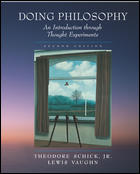

 Doing Philosophy: An Introduction Through Thought Experiments, 2/e The Problem of Skepticism and Knowledge Things Aren't Always What They Seem: Skepticism About Skepticism Multiple Choice |
 2003 McGraw-Hill Higher Education
2003 McGraw-Hill Higher EducationAny use is subject to the Terms of Use and Privacy Policy.
McGraw-Hill Higher Education is one of the many fine businesses of The McGraw-Hill Companies.